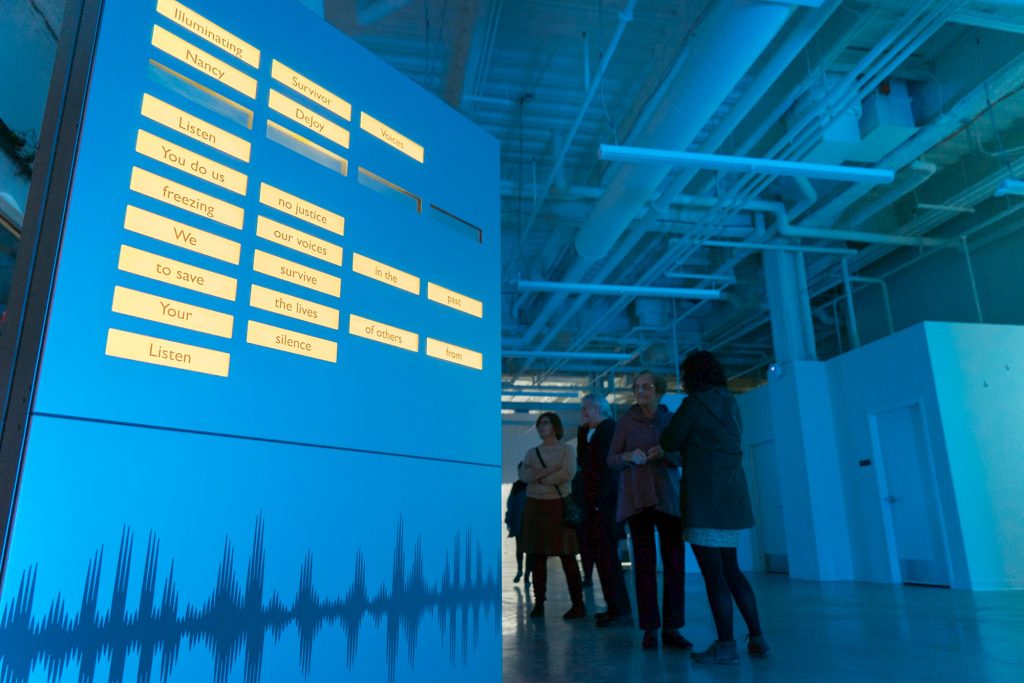
After making its initial debut at the Broad Art Lab in December, Associate Professor Nancy DeJoy’s poem, Illuminating Survivor Voices, which addresses the issue of silence in cases of sexual abuse, continues to make an impact on the MSU community as a symbol of culture change.
The poem, displayed as a light installation originally surrounded by 15 survivor statements projected onto the walls and floor, can now be seen at the Wharton Center for Performing Arts through April, and will be on stage for DeJoy’s TEDxMSU talk on Wednesday, March 27, in the Wharton Center’s Cobb Great Hall.
As a featured artist at MSU’s Social Justice Art Festival, which was held January 25, and as an upcoming TEDxMSU speaker, DeJoy, who is a member of the Department of Writing, Rhetoric, and American Cultures faculty, is spreading the message of the poem further across the MSU community. During her TEDxMSU talk, she will discuss how Illuminating Survivor Voices aims to uplift the voices of sexual assault survivors as valuable agents of culture change.

“Illuminating Survivor Voices,” at the Broad Art Lab in December.
The TEDxMSU talk emerges from research DeJoy did with survivors of sexual assault and from the reading of public, published survivor statements.
“During that research, I started by asking the question ‘what do we think of when we hear the words survivor voices?’ What I discovered was that too often, we leave those voices in the past,” DeJoy said. “The [TEDxMSU] talk positions those voices as illuminating our path to a better future, one in which sexual violence is no longer accommodated in our environment.”
The Illuminating Survivor Voices installation is helping keep the topic of sexual violence at the forefront of conversation. The conversations that come as a product of DeJoy’s work are vital to exploring new ways to listen to survivor voices and to keep them from fading into the past.

“A commitment to not letting this go silent is very important because we are nowhere near the things that really need to be dealt with,” DeJoy said, “and we’re not going to get there if we don’t have conversations that are inclusive.”
DeJoy combats the possibility of the issue fading away by creating spaces of healing, learning, and listening.
“As a faculty member, one of the most important things I’ve done is make myself approachable as someone to confide in,” said DeJoy, who was on the Relationship Violence and Sexual Assault Hearing Board and now is a member of the Sexual Assault Nurse Examiner (SANE) Program Advisory Board. “I tell my students I’m on that [SANE] so they know I’m open to hearing their stories. Making decisions to be on those committees, doing those services, and spending that time as a faculty member has been big for me. You cannot isolate yourself in the classroom as a member of the faculty. I will continue to work to support survivors and eradicate sexual violence in our community.”
“A commitment to not letting this go silent is very important because we are nowhere near the things that really need to be dealt with and we’re not going to get there if we don’t have conversations that are inclusive.”
Nancy DeJoy, Associate Professor
In addition to her service work with SANE and opening herself up to listening to survivor voices, DeJoy held a workshop in December for staff members of the College of Arts & Letters. The workshop included brainstorming ideas about how staff members could better support survivors by becoming active listeners and creating support networks for students.
DeJoy plans to expand upon this work by creating a workshop for students interested in learning about and combating sexual violence through art for social justice projects.
Written by Annie Dubois


